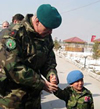The following are excerpts from articles published in the New York Times and the Seattle Time, respectively, on January 4 and 5, 2011, by Anthony Shadid.
“Around 1300, the Ottoman Empire, based in Turkey, began a 600-year rule that at its height included more than 2 million square miles taking Muslim culture to the doorstep of Christian Europe in the Balkans, south into modern day Yemen, and as far west as modern-day Algeria. The Western-leaning, highly developed social, economic and military institutions sustained it until declining after its defeat by the Habsburg army in Vienna in 1683. Its ill-fated alliance with Germany in World War I, led to its division by European colonial powers, with the resulting demographically problematic boundaries created mainly by the British and French generally seen as the source of much of the Middle East turmoil that followed.
“A Turkey as resurgent as at any time since its Ottoman glory is projecting influence through a turbulent Iraq, from the boomtowns of the north to the oil fields near southernmost Basra, in a show of power that illustrates its growing heft across an Arab world long suspicious of it.
“Its ascent here, in an arena contested by the United States and Iran, may prove its greatest success so far, as it emerges from the shadow of its alliance with the West to chart an often assertive and independent foreign policy “Turkey’s influence is greater in northern Iraq and broader, though not deeper, than Iran’s in the rest of the country. While the United States invaded and occupied Iraq, losing more than 4,400 troops there, Turkey now exerts what may prove a more lasting legacy — so-called soft power, the assertion of influence through culture, education and business.
“Turkey’s newfound influence here has played out along an axis that runs roughly from Zakho in the north to Basra, by way of the capital, Baghdad. For a country that once deemed the Kurdish region in northern Iraq an existential threat, Turkey has embarked on the beginning of what might be called a beautiful friendship.
“In the Iraqi capital, where politics are not for the faint-hearted, it promoted a secular coalition that it helped build, drawing the ire of Iraq’s prime minister, Nuri Kamal al-Maliki, along the way. For Iraq’s abundant oil and gas, it has positioned itself as the country’s gateway to Europe, while helping to satisfy its own growing energy needs.
“While some Turkish officials recoil at the notion of neo-Ottomanism — an orientation of Turkey away from Europe and toward an empire that once included parts of three continents — the country’s process of globalization and attention to the markets of the Middle East is upsetting assumptions that only American power is decisive. Turkey has committed itself here to economic integration, seeing its future in at least an echo of its past.
“The economic boom they have helped propel has reverberated across Iraq. Trade between the two countries amounted to about $6 billion in 2010, almost double what it was in 2008, Turkish officials say. They project that, in two or three years, Iraq may be Turkey’s biggest export market.
“Turkish officials talk about transforming the region into something akin to the American-Mexican border, a frontier as ambiguous as any line on a map is precise. Even some Kurdish officials have embraced the idea, though interpreting the notion differently.
“Oil is still king in Iraq, and as much as anything else, underlines Turkey’s interests here. The pipeline from Kirkuk, Iraq, to Ceyhan, Turkey, already carries roughly 25 percent of Iraq’s oil exports.
“The Turks have signed on to the ambitious $11 billion Nabucco gas pipeline project, which may bypass Russia and bring Iraqi gas to Europe. Turkish companies have two stakes in oil contracts, and two more in gas projects, potentially worth billions of dollars. In a land of oil, no place has more than Basra.
“Turkish ships offshore provide 250 megawatts of electricity a day. Turkish companies have refurbished the Sheraton Hotel in Basra and are helping to build a 65,000-seat stadium. The Turkish national air carrier is planning four flights a week from Istanbul to Basra; only one is offered now, by Iraqi Airways. ‘No one is working here except Turkey,’ said [Ali Riza] Ozcoskun, the Turkish consul in Basra.”

























